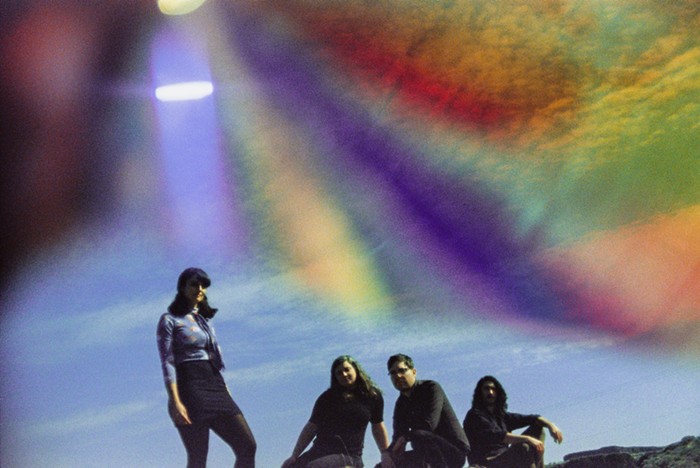Trans Am w/the Fucking Champs, Neil Hamburger, Laddio Balacko
I-Spy, 1921 Fifth Ave, 374-9492, Thurs Sept 21, 9 pm, $8/$10.
HOW FAR BACK should something be in the cultural rear-view mirror before it's open territory for appropriation and reinvention? In the case of music and musicians, apparently not that far. In a musical landscape where genres have basically become foster children, constantly being shuffled from home to home, a band like Washington D.C.'s Trans Am are definitely right at home. Their latest record, Red Line, gives shelter to the theatrics of the '70s rock sound, new wave in the futurist vein of Gary Numan, and Lost Boys-style goth. All such influences are layered over an indie power trio sound à la Shellac.
Red Line is what I would imagine the soundtrack to the sequel of Blade Runner being like. Tense percussion and ominous keyboards create a score for a bleak future society in which the City has taken on monstrous proportions and no one can be sure who is human and who is not. However, we all know that at least for the moment, that world only exists in Philip K. Dick novels and the reaches of academic theory--which, in some respects, shows how far Trans Am have come.
Their 1996 self-titled debut EP was a strictly ironic affair, featuring laugh-out-loud parodies of the "rock" style with some Casio one-liners thrown in almost as an afterthought. But compare this to the prevailing mood of earnest, sincere rock of the time and you have a record that surely turned some scratching heads. Their 1997 Surrender to the Night went a little further afield: Essentially their take on "get busy" music, they ventured into the shady cul-de-sacs of smooth groove, augmented with liberal doses of robo-funk and lazy, dubbed-out electro-beats. With John McEntire (Tortoise) behind the board, the album achieved a cool, restrained vibe that none of their other records seemed to have, and it appeared as if this would be the tangent they would follow for a while. Not so. According to the website of their label, the venerable Chicago outfit Thrill Jockey, Trans Am's next record, The Surveillance, was a comment on the dangers of privately owned technology. In that regard, it's important to approach Trans Am's music with a smirk, and a sense of waiting for the punch line.
The old adage that everything old is made new again provides a useful metaphor for approaching Red Line. In a society like ours, itself based on a model over 2,000 years old, artistic expression is almost always tied to something that has come before. Apparently there are only so many creative "elements" to draw upon, but an infinite amount of ways to mix them together. The same way that Warhol's soup cans forced the world to reassess the meaning of commercial imagery, Trans Am manage the relatively rare feat of showing us new ways of listening to the music we grew up with--music which, to a certain degree, has influenced our identities.
Of course this happens all the time in other genres (entire websites have been devoted to deciphering the samples from Paul's Boutique), but the dangers of privately owned technology aside, Trans Am's project is a little different. As a mainly instrumental band, they explore the interaction between the sounds made by humans in contrast to the sounds fabricated by humans, and it's never really clear which side they're on.
Red Line is moody. Muscle-car-worthy rock jams blend into atmospheric, creepy keyboard fugues and back again throughout its 73-minute duration, and like Blade Runner, you're left without a sense of resolution--only the sense that your world has another dimension to it that you didn't realize before.
The real irony inherent in a band that tries to create the sound of the future, beyond the fact that they look to the past for their inspiration, is that futurism becomes dated almost as soon as it's created. In the same way that outdated monuments to futurism like the Space Needle and 2001: A Space Odyssey tried to shine a light into a cultural space no one could begin to imagine (and have since become naive relics of their times), Trans Am are probably doomed to stumble into the same pitfall. Their brand of future funk and rock begs the question: If this is the sound of the future, how come it's so familiar?


















